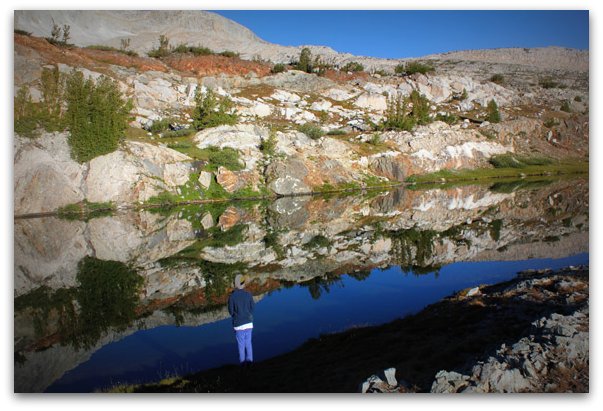Discovery
The end. The end scares us. It scares because when we talk about the end, ultimately we come to talk about the end of life itself. Not in some great apocalyptic way but in the more certain sense that we will cease to exist. And when we contemplate this idea we have to face up to the mystery of our being. But do we need to fear it? Isn’t there a way to live our lives with a constant realization of this fact and instead of fear show gratitude? Gratitude for the gift of discovery. And it is on this journey of discovery that we all must embark in our own time and through our own eyes.
I went camping with my son a few weeks ago in the Sierras at a place called Saddlebag Lake. From what I can find it is the highest lake in California reachable by road. At the far end of the lake is a place called the Twenty Lakes Basin. When you imagine what alpine lakes look like you are imagining what we found. After a few miles of hiking at the end of a long day we came across this small lake and set up camp. We had the whole place to ourselves. The next morning it was very cold and the sun had just risen so we went over to the lake to watch for trout and that is when I took this picture. When I got home my wife pointed out how hard it was to tell what he standing at the edge of. Would he step off into the lake or into the sky. The beginning or the end. Many times they are the same thing, much like they are in the picture. I am sure you have seen pictures like this before but what makes this one stand out for me is the way my son is standing there in just the right place to blur the line between what we expect and what we are witnessing with our eyes.
“We shall not cease from exploration, and the end of all our exploring will be to arrive where we started and know the place for the first time.” – T.S. Elliot.
This is another popular quote that you will find all over the place but it never gets old for me. At the end we will arrive and know the place for the first time. At the end. Where the lines blur.
Mind Training
I love reading lists and I will be putting one up here soon. But in the meantime…..I had the pleasure of sitting in a jury room last week, I didn’t end up having to serve but I was able to finish a really great book. I picked it up years ago and had forgotten all about it but books have a way of finding us when we need them. This one is called The Monk and the Philosopher and it’s a conversation between a father and a son as they discuss the meaning of life. I will give a brief set up here but I highly recommend this book to anyone interested in the really big questions that have faced generations of truth seekers. Both men do a great job of trying to understand the other and share a wealth of experience from both Eastern and Western cultures. The father is Jean-Francois Revel, a French Philosopher and the son is Matthieu Ricard, a Buddhist monk who had previously been a molecular biologist. I marked many passages in the book but one of the early ones stood out for me. Here is the brief interchange:
J.F – (Father) OK, I understand that you applied the same rigor that you had used before to your research into the history and philosophy of Buddhism, the texts, and so on. But research in molecular biology over the last thirty years has been the field of some of the most important discoveries ever in scientific history. You could have taken part, but you didn’t.
M. – (Son) Biology seems to have been doing fine without me! There’s no shortage of researchers in the world. The real question for me was to establish and order of priorities in my life. Increasingly, I had the feeling that I wasn’t using the potential of human life as well as I could, but that day by day I was letting my life slip away. For me, the mass of scientific knowledge had become a major contribution to minor needs.
This really nailed it for me. We live in a culture of progress. Now there is nothing wrong with progress and the discussion that follows is well thought out on both sides but in life you have to make choices. And here is a man making a choice. For him science can only attend to minor needs. The really big stuff that we wrestle with, happiness and suffering, finding a way to be comfortable with who we are in the world and how we are supposed to act within it, these are the questions that arise when we contemplate the end. When we realize that our time is a gift and we should find a way to treat it as such. This requires a way to interact with the world that fits who you are and who you can become. One way to begin this journey is mind training. That is a phrase that Matthieu uses in a TED talk he gave in 2004 when he talks about happiness and meditation. I love the phrase because it seems to bring the idea of mediation into our daily life. In the same way we must train our bodies, we must train our minds. Train it to take full advantage of the present moment and to be ready when we reach the end and know the place for the first time.
